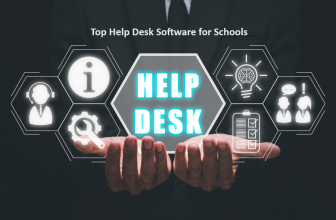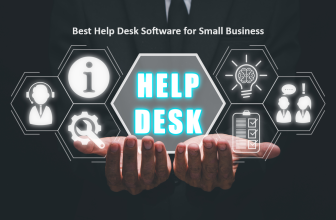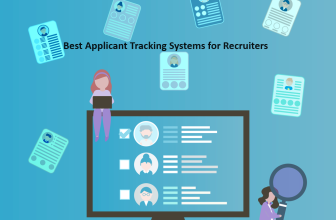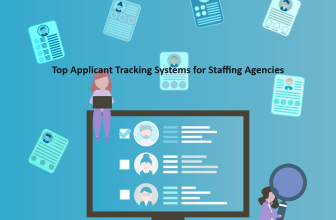For many years, Trello has been the industry standard for project management software. It popularized the Kanban approach to project management and inspired most of the tools that joined the market later.
Notion is a newcomer but has taken the project management industry by storm. So which tool is best for your team?
This post looks at some similarities and differences between Notion and Trello. Keep reading to find out which one works best for you.
What we cover
What Does Notion Do?
Notion describes itself as the place where you can “think, write, collaborate and plan.” It allows you to take notes, add tasks, manage entire projects, and more.
Imagine your project as a lego structure. Notion gives you the building blocks to create the layouts and toolkits to get the work done.
Many people refer to the tool as an “internal wiki” that allows individuals and teams to plan their projects, work, and goals.
Notion lets you use the Kanban view, a simple list view, or even a calendar view and capture your workflows using spreadsheets and databases.
The tool is available on all platforms, including Mac, Windows, Web, iOS, and Android.
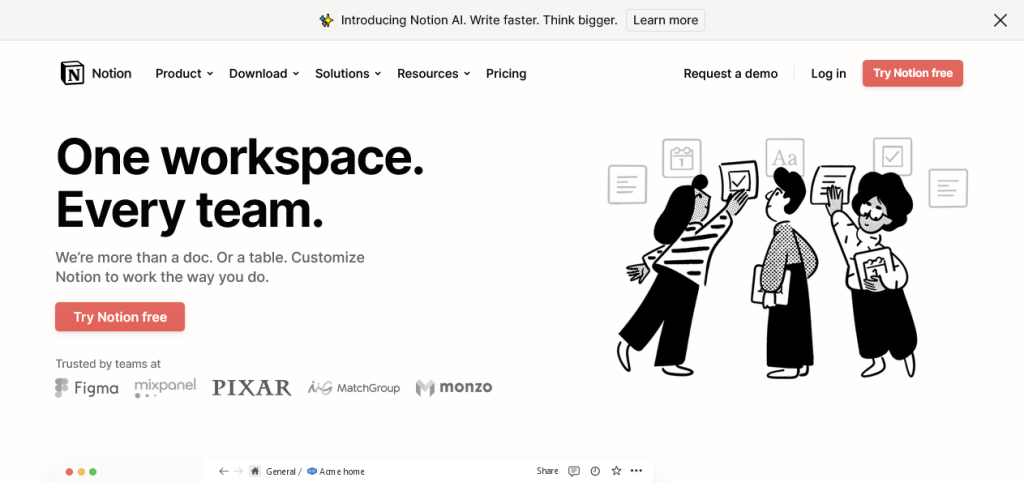
What Does Trello Do?
Trello is a collaborative tool that allows you to manage your projects and divide the jobs into boards.
The tool provides you with the following information:
- What is being worked on?
- Who’s working on it?
- What’s the task’s progress?
- What’s the overall project progress?
Imagine Trello as a whiteboard with lists of sticky notes. Each sticky note is a task for you and your team.
Now imagine each sticky note has images, attachments, and other data sources like Salesforce or Jira documents and a section to collaborate with your teammates.
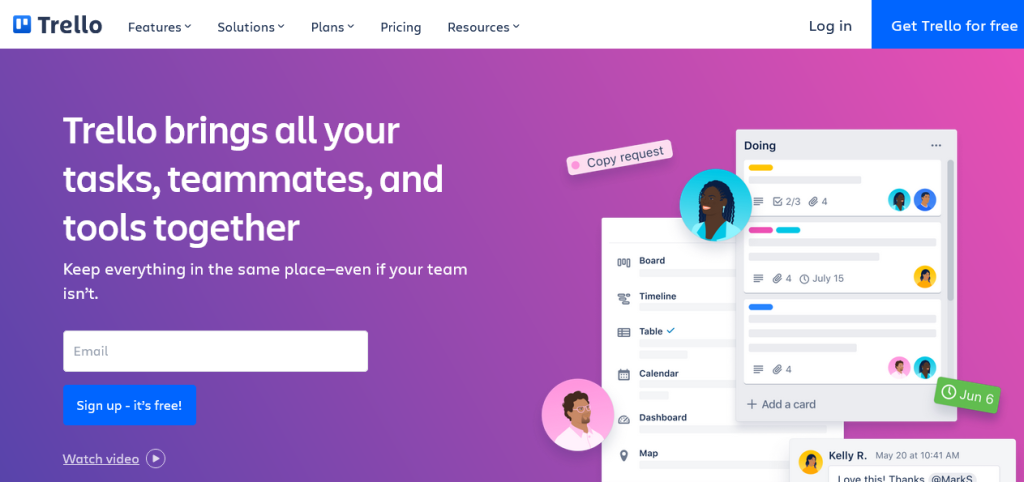
Similarities Between Notion and Trello
While Notion is relatively new to the market, it’s quite similar to Trello. Below are some of the main similarities between Trello and Notion.
Collaborate With Your Team
Apart from managing your projects, both Trello and Notion allow you to collaborate with your team on tasks. You can assign roles and check the progress of individual tasks and the overall progress of the whole project.
This allows you to monitor your team’s productivity and keep track of a project to ensure it meets its deadline.
Both Tools Allow You to Use Kanban Project Management
Kanban project management is an agile framework you can use to visualize and improve workflows and increase the efficiency of your projects.
While Notion has several project management methodologies, it allows you to use Kanban. Trello, on the other hand, exclusively uses kanban.
The Kanban methodology takes a visual approach to project management, which many people find intuitive and easy to use. Its emphasis on delivery also encourages team members to improve their efficiency.
Free Plans
Most businesses have to pay for various tools and software to accomplish their projects. Therefore, it’s always welcome to use tools with free plans where they can.
Both tools have a basic free plan. While the plans don’t offer too many features, they’re perfect for small businesses that want to improve their productivity with project management software.
Difference Between Notion and Trello
Although Notion and Trello have the same primary use, they’re different in several ways. Below are some of the most prominent differences between Trello and Notion.
Features Comparison
Using Trello for Kanban offers fast and smart project organization. Its drag-and-drop functionality makes everything fluid and easy to customize.
Its key features focus on:
- Project management: Optimal when used with power-ups that allow you to create burn-downs, burn-ups, CDF, or cycle time charts.
- Task management: Trello has templates you can customize to fit your project. You can attach files, use checklists, and add colored labels to make your tasks more manageable.
- Integrations and reporting: Trello allows you to improve your workflows’ efficiency by adding power-ups and integrations. These help you analyze your team’s effort and productivity.
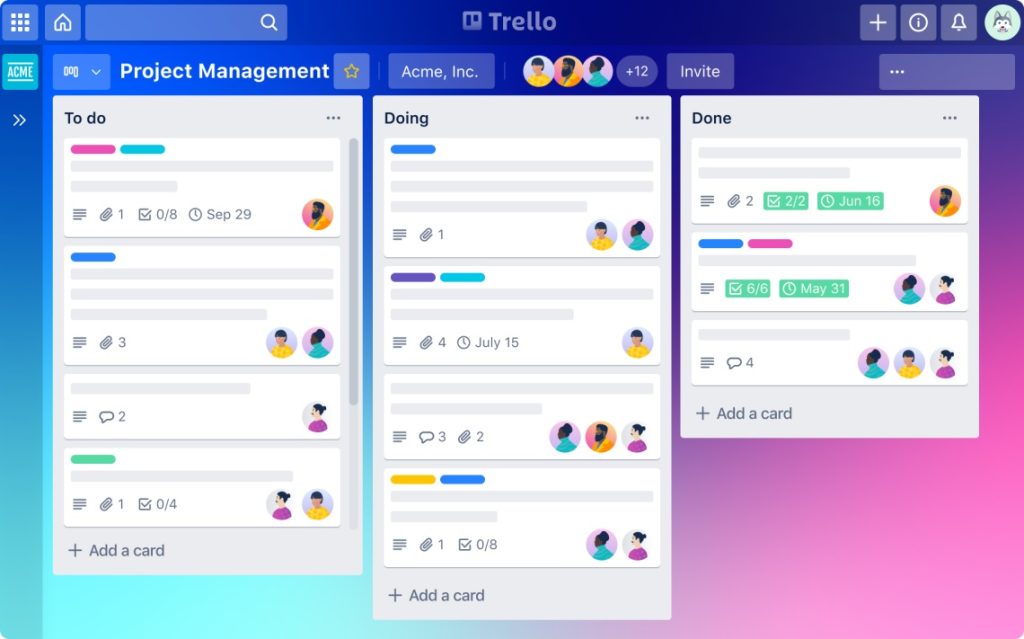
On the other hand, Notion gives you a one-stop tool for to-do-lists (like Todoist), note keeping (like OneNote), data management (like Airtable), calendar (like Google calendar), and project management (like Trello.) This makes it a great tool for generalists.
Notion’s primary features focus on:
- Task management: Notion productivity allows users to organize their tasks with wikis, notes, databases, Kanban boards, calendars, and reminders.
- Project management: Notion’s kanban boards allow you to create custom lists and tables for different tasks.
- Note-keeping: Whether you want to put down important ideas or give your team some notes, Notion’s Note-keeping allows you to put down and keep the notes.
- Integration: Although the list is not as extensive as Trello’s Notion gives you several integrations without having to install power-ups.
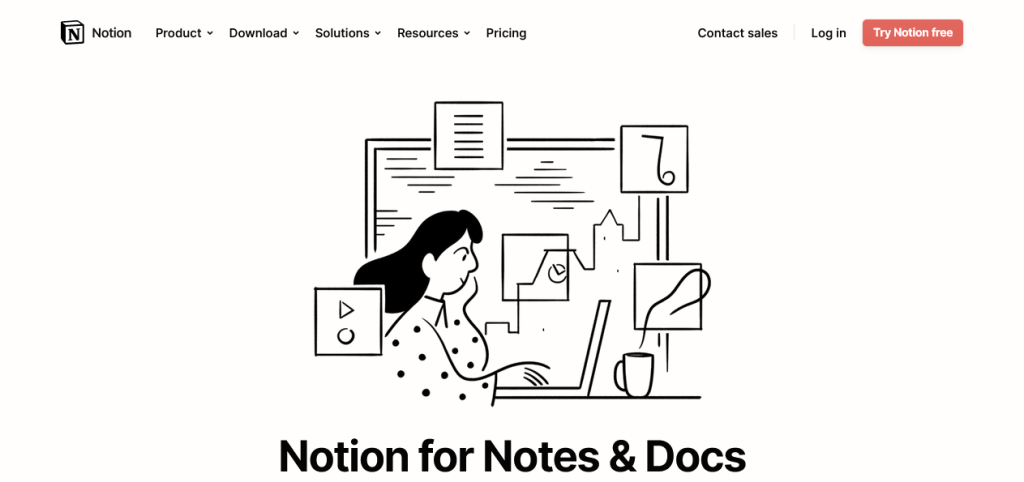
Project Views Comparison
Both Trello and Notion have several types of project views. The Kanban view, in particular, is similar between the two software.
However, Trello takes a more visual approach with multiple-colored cards, with each color representing a certain stage of the project.
Project Templates Comparison
Both Trello and Notion have pre-designed templates to get you started on your project. Trello offers hundreds of free templates for education, business, design, marketing, productivity, and more.
Notion also offers countless third-party templates from its community gallery.
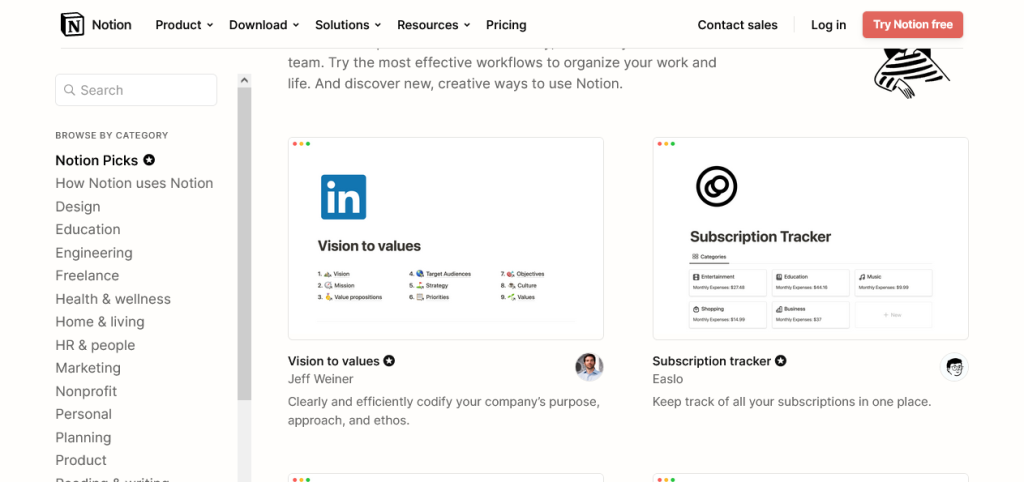
Time Tracking and Resource Management Comparison
Notion and Trello have excellent resource management features that allow you to delegate tasks to individual team members. They also allow you to see each task’s current progress in real-time.
However, Trello has a “watch” feature. If you add the feature to a card, you get notifications each time it changes its status.
Formulas
Both Trello and Notion have calculations and formulas. However, Trello has a more extensive and functional list.
Customization Ability
Both tools offer impressive customization options, with Notion having a slight advantage.
Trello is fun and allows you to add beautiful imagery, colored and labeled cards, and automation. That said, you might need power-ups to access more customization.
On the other hand, you can access these and more customization options on Notion without power-ups.
Compatibility and Integration
Notion integrates with many tools that improve your productivity. For instance, it easily connects with Google services like Gmail and Google Drive.
You can also connect Notion to services like Twitter for your social media interactions, form building, and online surveys.
Trello integrates with your team’s favorite apps like Jira, Salesforce, Gmail, and Invision. For instance, you can use Slack to collaborate with team members and use Dropbox to share files.
Trello also allows you to create custom workflows for your business by adding power-ups to your boards.
These power-ups can convert your boards into anything from social media calendars to customer support ticketing systems.
Device Compatibility and Apps
Trello and Notion are compatible with many devices. Notion is available on Android, Windows, macOS, iOS, and the web.
Trello works on Android, Windows, iOS, and the web. Therefore, it’s not available for installation on macOS. If you need to use it on a macOS device, you must use the web app.
User Interface Comparison
Trello’s user interface is easy and fun to use. It has drag-and-drop features that make organization fast and easy. It’s also transparent and lets you keep your projects and team aligned.
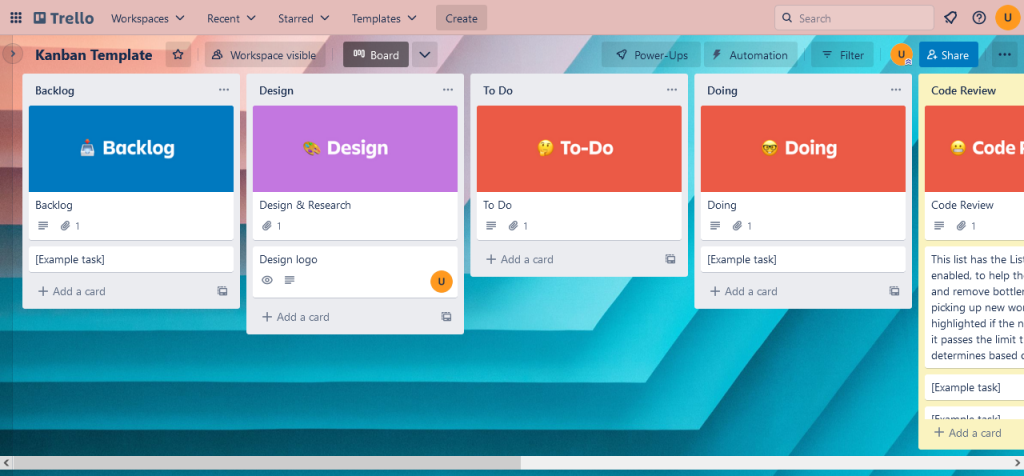
While Notion’s user interface looks easy to use, it requires more time and planning sometimes. Therefore, Trello is your best bet if you’re looking for a quicker option.
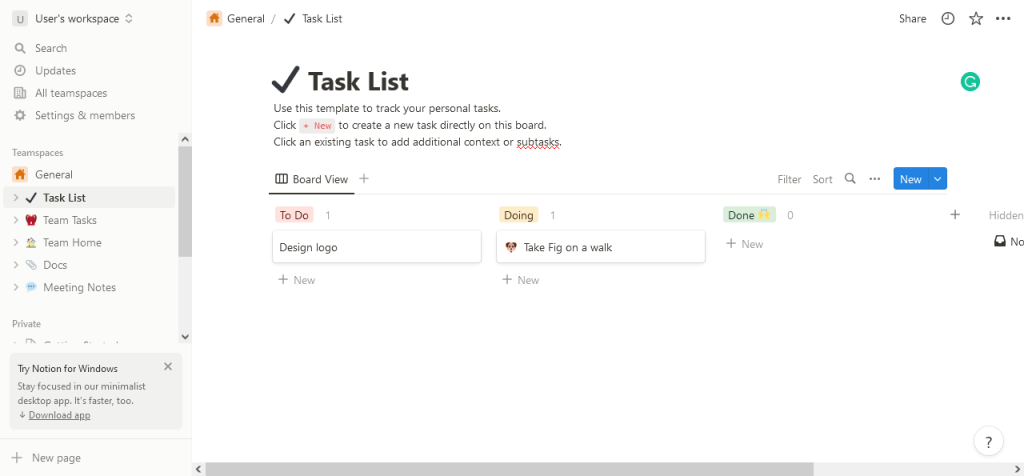
Team Collaboration and Communication
If you plan to use these productivity apps on your own, this criteria is not important. However, if you plan to use it collaboratively, this could be a deal breaker.
While Notion allows you to invite team members to your project, it doesn’t notify you of the latest updates, recent changes, or upcoming deadlines.
Trello offers you all these options, which makes it easier to keep track of your team and project.
Gantt Chart Support
Gantt charts are charts that show the completed work over a period of time against the time planned for the work. These charts help you monitor whether you’re still on course to achieve your set goals.
Notion has direct support for Gannt charts, while on Trello, you have to use third-party integrations.
Budgeting Capabilities
Both Trello and Notion have budget planning templates. However, the template is available directly on Notion, but you need power-ups on Trello.
Pricing Comparison
Trello offers several pricing options, starting with the free package. This package is excellent for individuals and small businesses that can’t afford a monthly subscription to project management software.
Trello also offers:
- A standard package for $5 per month: Best for small teams that need to manage tasks and scale collaboration.
- A premium package for $10 per month: Best for larger teams that need to track and visualize projects in multiple ways, including calendars, timelines, and boards.
- An enterprise package for $17.50 per month: Best for large organizations that need to connect multiple teams with more features and security.
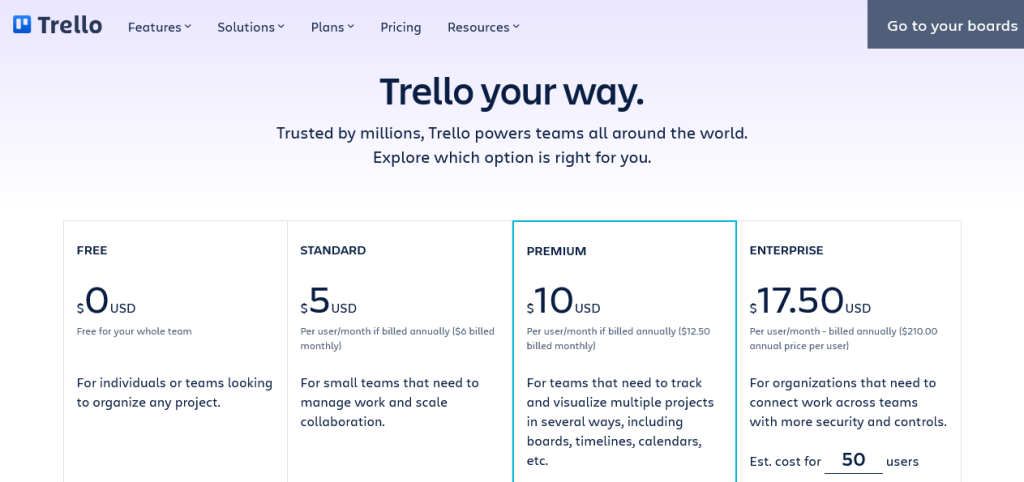
Notion also offers a free plan with unlimited pages and blocks, API, cross-platform synchronization, and up to 5 users.
There are also paid plans including:
- The personal pro plan at $4 per month: Best for power users who want more project management features.
- The team plan at $8 per user per month: Best for businesses that need more collaboration features.
- The enterprise plan at custom pricing: Best for large organizations that need more control over project management.
To get Notion’s custom enterprise plan, you can contact the sales team. It’s also important to note that the personal pro and team plans cost more when you pay monthly instead of annually.
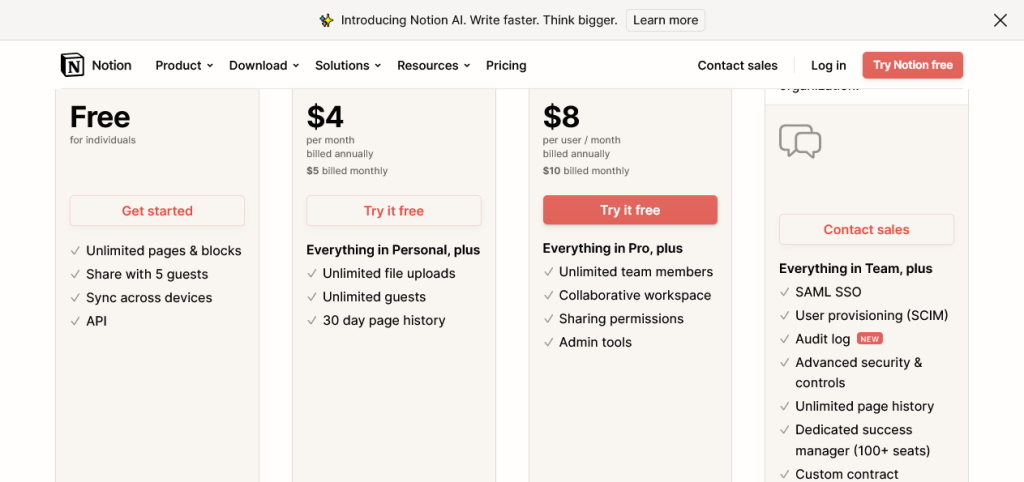
Customer Support
Trello only offers email support, with business and enterprise users being prioritized. However, you can also get tons of information from the Trello community.
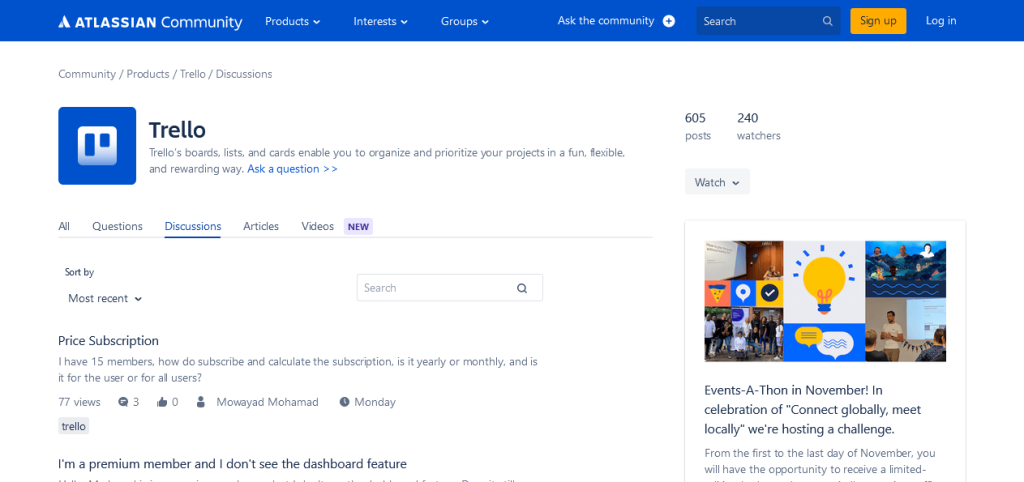
Notion, on the other hand, offers live chat and email support. However, more expensive plans are prioritized here too.
That said, Notion has an extensive resources tab with guides, blogs, and more.
Customer Reviews
Trello has a 4.4 out of 5-star rating from over 12,000 reviews on G2. Most positive reviewers enjoyed the layout, interface, and customizability.
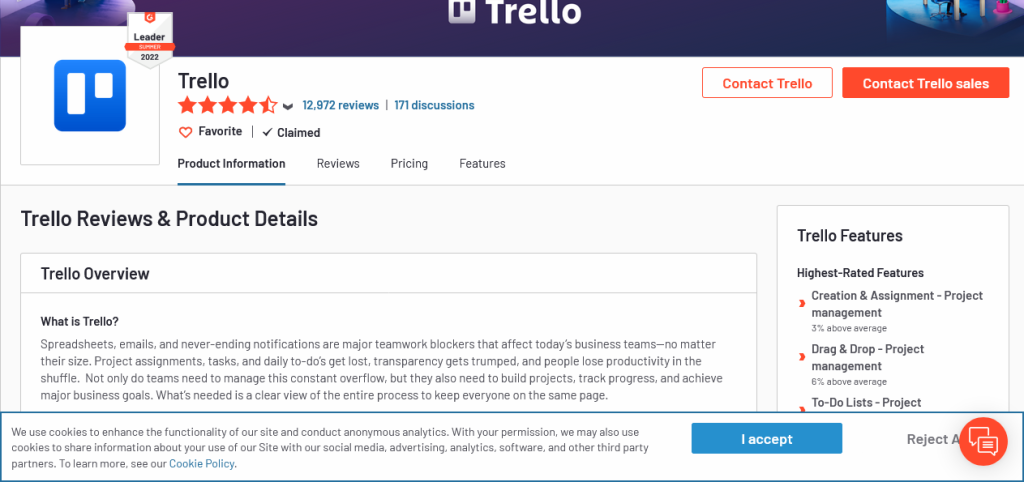
Notion has a 4.6 out of 5-star rating from over 1,000 reviews on G2. Most of the positive reviews cited flexible note-taking, while most of the negative reviews complained about the steep learning curve.
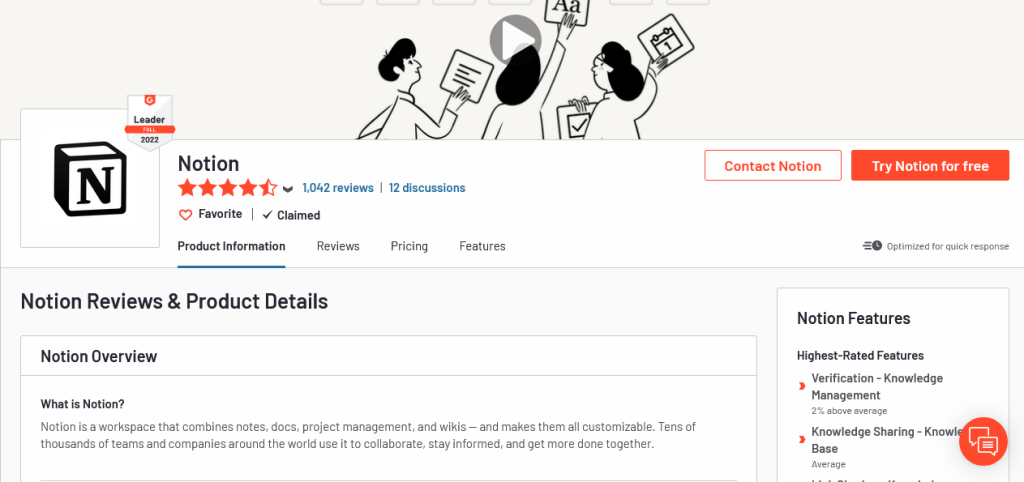
Pros and Cons Summary Table
| Notion | Trello | ||
| Pros | Cons | Pros | Cons |
| Free plan | Steep learning curve | Free plan | No direct Gantt chart support |
| Gantt chart support | Fewer customization options | More customization options | No direct support for macOS |
| Positive customer reviews | Better time tracking and resource management | ||
| Cheaper paid packages | Limitless integration with power-ups | ||
| Access to more features without power-ups | More intuitive interface |
Final Word
Notion and Trello are both great project management tools. However, Trello has fewer but refined features, while Notion offers a broader range of basic features.
When to Use Notion
Notion is an all-in-one suite that gives you a note-taking app, project management software, and more. It’s suitable for teams that need refined note recording and basic project management features.
When to Use Trello
Trello is a superb project management tool focusing on the Kanban methodology. It’s ideal for organizations that want better oversight of their teams and projects.




